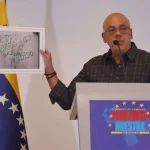
Saif al-Islam Gaddafi, son of Libya’s overthrown former leader Muammar Gaddafi, registered himself this week as a candidate for the upcoming presidential elections planned for December 24.
The television channel Al Ahrar aired images of Saif in a building belonging to the Higher Election Commission in the southern city of Sabha, where he signed the necessary documents for his inscription.
In an interview with The New York Times published in July, Saif defended his father’s legacy, suggested that it was time to return to the past, and hinted at his ambitions of becoming the leader of Libya.
“They raped the country—it’s on its knees,” Saif al-Islam Gaddafi said. “There is no money, no security. There’s no life here. Go to the gas station—there’s no diesel. We export oil and gas to Italy. We are lighting half of Italy, and we have blackouts here. It is more than a failure. It is a fiasco.”
Saif al-Islam Gaddafi is now 49 years old, and was held prisoner for several years after his father was overthrown and murdered a decade ago.
During the leadership of Muammar Gaddafi, his second son Saif was involved in diplomacy and public relations, and played a significant public role, although he did not hold an official title within the government. Saif al-Gaddafi holds an MBA from Vienna’s Imadec business school and a doctorate from the London School of Economics.
In the next few days, other key candidates will also announce their participation in the upcoming presidential elections. Amongst them will be figures such as Marshal Jalifa Haftar, Interim First Minister Abdul Hamid Ddeiba, and Head of Parliament Aquila Saleh.
As of now, the former ambassadors Ibrahim Dabbash, Aref Al Nayed, and Abdel Majid Ghaith Saif Al Nasr have all announced their aspirations of becoming head of state. The comedian Hatem Al Kour has also announced his intention of running for president.
Other names that will be on the ballot are Abdulhadi Al Hawaij (former Minister of Foreign Relations), Fathi bin Shatwan (former Minister of Industry) and Fathi Bashagha (former Interior Minister), in addition to the former leader of the Presidential Council Ahmed Maiteeq.
Libya has lived a spiral of violence ever since Gaddafi was overthrown in 2011. This de facto coup d’état was the result of a war supported by the North Atlantic Trade Organization (NATO) in which the United States, France, the United Kingdom, and Canada played a central role.
RELATED CONTENT: A Decade Ago: US-NATO Invasion of Libya and its Consequences
In February, under the guidance of the United Nations, 75 Libyan delegates representing various territories and political factions chose a transitional government with the goal of making the upcoming December elections possible.
According to the news agency EFE, Libya’s General Military Prosecutor has requested that the Supreme Electoral Commission suspend Saif al-Islam Gaddafi’s candidacy on the grounds of supposed crimes against humanity.
In a letter sent to the head of the Supreme Electoral Commission Imad al Sayeh, the Military Prosecutor Mohamed Gharuda asked that this measure be equally applied in the case of Marshal Jalifa Hafter, supervisor of the Parliament in the eastern city of Tobrouk and Libyan strongman. Gharuda also clarified that al Sayeh would be responsible for “any infraction produced” regarding both cases in relation to the electoral process, the prognosis of which is still uncertain due to the disputes between the competing powers.
Featured image: Saif al-Islam Gaddafi. Photo: Últimas Noticias.
(Últimas Noticias) with Orinoco Tribune content
Translation: Orinoco Tribune
OT/KW/SL
- July 24, 2024





